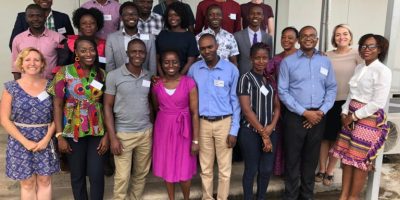Recent public outcries in cities across eastern Democratic Republic of Congo (DRC) provide an opportune time to reflect on underlying issues affecting the Ebola response and wider humanitarian efforts in the region.
An increase in violent attacks on the population by armed groups in the epicenter of the Ebola outbreak since November has resulted in 242 deaths as of January 2019. As the death toll rises, people have taken their frustrations to the streets, citing the failure of local and international actors to fulfill their mandate in protecting the population. Following numerous simultaneous attacks in different areas in Beni territory, daily activities have been disrupted and communities have organized ville morte in Beni, Butembo, and Goma as a sign of protest, mourning, and solidarity.
The surge of violence against civilians started in early November and has occurred almost every day since DRC armed forces launched a military offensive on October 30 against domestic and foreign armed groups operating in the east.
Meanwhile, there has been a resurgence of new Ebola cases —89 new cases were reported in Oicha, Mabalako, Butembo, Mandima, and Biena between 29 August, 2019 and 2 Jan, 2020—creating further complications in a situation that has already faced many challenges. The situation is so dire, Richard Kivanzanga, the deputy administrator of Beni territory, told Reuters, that it wasn’t possible to evacuate all of the bodies from the massacres, let alone address the health consequences related to the Ebola epidemic. It is important to note that new cases had popped up before the outbreak of violence with peaks and declines from July to early October. Despite some positive signs in the reduction of the total number of cases, new infections continue to be reported and have increased over the past three months.
What does this tell us? Something that we already know –neither violence nor Ebola are new in DRC, yet both humanitarian and peacekeeping interventions have failed to adequately apply lessons learned, address underlying issues, and reflect on how intervening actors engage with communities. The sheer number and brutality of attacks demands immediate attention but also provides a critical time to listen, re-examine, and learn.
Recurrent Issues Not Addressed in Ebola Context
Atrocities in Beni territory are not new. Residents of Beni and surrounding towns have experienced brutal killings, forced displacement, and kidnappings since 2014, yet little has been done to protect civilians as they face recurrent crisis. In a recent commentary, former UN coordinator of the UN Group of Experts on DRC cites similarities between the latest turn of events and operations against ADF in 2014 that led to subsequent retaliatory attacks against the population. This could have been an opportunity for intervening actors to reflect on, share, and act upon learning from earlier operations and their unintended consequences. One vital lesson is the need to give due attention to the underlying reasons behind the frustrations and mistrust of communities.[1]
When the current Ebola virus disease broke out in North Kivu in August 2018, the underlying issues of violence had not been properly acknowledged and therefore were not addressed. Ebola response teams faced a tense political and security context, weak infrastructure and health systems, and growing mistrust of government and international authorities, forming a complex backdrop to how communities would perceive the Ebola outbreak and responses to it.
Nevertheless, the first months of the Ebola response saw promising collaborations between response teams and the local community. Residents in the region quickly mobilized and adopted new rules and behaviors, even going against cultural norms to prevent the spread of the disease –limiting physical contact, changing food and dietary habits, and restricting attendance at public gatherings. These rapid actions by community members have been an important factor in successfully managing previous outbreaks in the DRC. Ebola response efforts in DRC have been faster and more effective than outbreaks elsewhere, due to prior experience and national expertise from nine epidemics and public uptake of responsibilities by community leaders, traditional chiefs, religious and social leaders, and medical staff.
However, the challenges faced by humanitarian organizations in addressing issues of mistrust, insecurity, and poor health infrastructure have threatened current Ebola response efforts and further undermined community relations and confidence in wider humanitarian interventions.
Given the well-documented challenges and limitations of the current Ebola outbreak, there has been limited reflection on past mistakes and oversight, including inadequate investment in sustainable health infrastructure and addressing wider needs like people’s concern of neglect in dealing with ongoing insecurity and government oppression. From the beginning, Ebola response strategies should incorporate knowledge transfer from previous outbreaks and carry out thorough assessments that include risk analyses, do-no-harm and conflict sensitivity measures, and continued social, political, and historical analyses of the context to understand underlying issues that affect community engagement and communication. Responders would be wise to plan exit or transition strategies from the outset, and communicate these so that trust is built and expectations are set in communities and across the health system.
There is a need to consider, thoughtfully and compassionately, people’s frustrations; for instance, with money pouring in to combat Ebola at the expense of other pressing health issues like a recent measles epidemic, malaria, and malnutrition. This would convey that community voices and needs are listened to and are taken into account when decisions are made. Furthermore, by identifying community strengths in managing previous Ebola outbreaks, response efforts can build on existing capacities and trusted networks. Despite a wealth of knowledge from nine previous outbreaks and the long-known conditions of DRC’s poor health infrastructure, attention and funds go to short-term relief at the expense of long-term investment —of time, capacity building, and funds—in sustainable health infrastructure that would help to better address future Ebola outbreaks.
Controlling Ebola in DR Congo should be possible as it has been in the last nine outbreaks, but in the absence of security, trust in people and institutions, and a robust health system, “a cycle of tragic, multimillion-dollar health disasters will continue to flourish in the DRC,” director-general of the World Health Organization (WHO) warns. Effective transition strategies by donors involved in the Ebola response should include contributing to efforts that strengthen the health system and facilitate planning for longer-term investment in the health sector and other structures that address social determinants of health . Residual funds and medical tools, for example, could go to equipping local health centers and labs.
The current situation provides an important opportunity to not only reflect on the strengths and weaknesses of response strategies but also recalibrate priorities, most importantly how intervening actors –whether humanitarian or peacekeeping– engage with local communities. It is particularly important to re-examine and adjust the ways in which we operate in a context that is characterized by a myriad of still-unaddressed challenges despite a long history of interventions. Listening to the needs of community members and helping to address their main concerns of security, protection, and care will not only improve current intervention efforts but also help to bolster understanding, trust, and confidence in future emergency responses.
[1] See Rokhideh, M. ‘Contextualizing Beliefs about Ebola During Conflict: Perceptions and Responses to the North Kivu Outbreak,’ forthcoming.



![A sign posted in Beni on November 25 in response to the UN and Ebola responders. Translation: MONUSCO and Ebola staff should leave this place. We have started an operation against MONUSCO, tomorrow you will see [the bandits we are].
A sign posted in Beni on November 25 in response to the UN and Ebola responders. Translation: MONUSCO and Ebola staff should leave this place. We have started an operation against MONUSCO, tomorrow you will see [the bandits we are]. Reproduced with permission.](https://www.socialscienceinaction.org/wp-content/uploads/2020/01/Maryamblog-768x1024.jpg)

